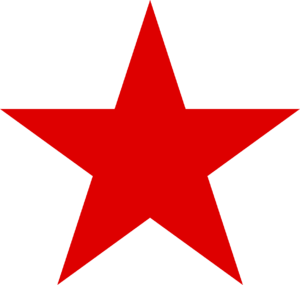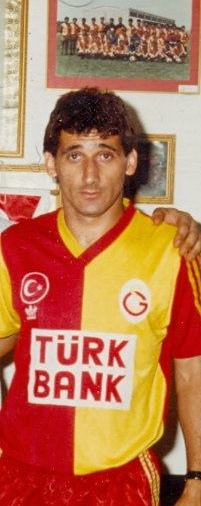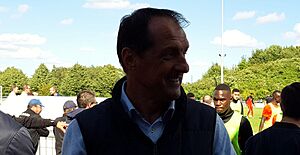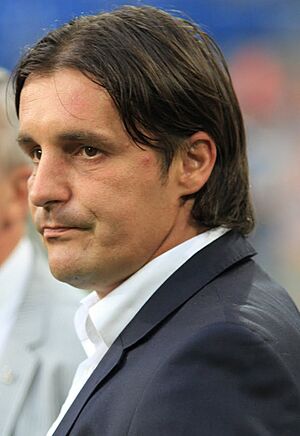History of FK Sarajevo facts for kids
Fudbalski klub Sarajevo (often called FK Sarajevo) is a professional football club. It is based in Sarajevo, the capital city of Bosnia and Herzegovina. FK Sarajevo is one of the most successful football clubs in the country.
This article shares the club's exciting journey from its start in 1946 until today.
Contents
- Club History
- Early Years and Growth (1946–1965)
- First Championship Title (1965–1967)
- A Period of Change (1967–1979)
- Second Championship Title (1980–1985)
- Years Before the War (1985–1992)
- Sarajevo as a Touring Club (1992–1994)
- New Beginnings (1994–2000)
- The Joint League Era (2000–2013)
- The Vincent Tan Era (2013–2019)
- New Ownership and Recent Success (since 2019)
Club History
Early Years and Growth (1946–1965)
FK Sarajevo was founded on October 24, 1946. It was formed by combining two local Sarajevo football clubs, Udarnik and Sloboda. The club first played under the name SD Torpedo. The first chairman was Safet Džinović.
The team played its first match on November 3, 1946. They won 6–0 against Bratstvo Travnik. In 1947, the club's name changed to SDM Sarajevo. Finally, in 1949, it became FK Sarajevo, the name it uses today.
In 1948, famous Yugoslav player Miroslav Brozović joined the club. He became the player-manager and helped the team get promoted to the top league. FK Sarajevo first joined the top-tier Yugoslav First League in 1949. They were relegated once but quickly returned in 1950. After that, they stayed in the top league for many years.
In 1950, FK Sarajevo went on its first international trip to Belgium. They played friendly matches and even beat a team of top Belgian players. The club also toured Turkey, winning against famous teams like Galatasaray and Fenerbahçe.
A legendary striker, Asim Ferhatović, joined the team in 1955. He quickly became the club's top scorer. Other important players from these early years included Franjo Lovrić, Ibrahim Biogradlić, and Lev Mantula.
First Championship Title (1965–1967)
By the mid-1960s, Asim Ferhatović, known as Hase, became the club's biggest star. In the 1963–64 season, he was the top scorer in the league with 19 goals. The club finished fourth that year.
Sarajevo won its first ever Yugoslav First League title in the 1966–67 season. This made them the first national champions from Bosnia and Herzegovina. The team had a fantastic start, winning against FK Sutjeska Nikšić and their city rivals FK Željezničar. They also drew against European Cup finalists, FK Partizan.
By the winter break, Sarajevo had won 14 of their first 20 league games. They were in first place! They continued their strong performance, beating Red Star Belgrade 3–1. In the final league game, Sarajevo hosted NK Čelik in front of 30,000 fans. They won 5–2, securing their first league title.
This victory allowed Sarajevo to play in the 1967–68 European Cup. They beat Cypriot team Olympiakos Nicosia. In the next round, they faced the famous English club, Manchester United. Sarajevo drew the first game 0–0 at home. They lost the second game 2–1 at Old Trafford and were knocked out by the eventual champions. Key players from this championship team included Boško Antić, Mirsad Fazlagić, and Vahidin Musemić.
A Period of Change (1967–1979)
After winning their first title, FK Sarajevo went through a period of changes. They didn't manage to win the league again for a while. Many players from the championship-winning team left the club.
During this time, the club still went on international tours. They played friendly matches in places like Malta, Pakistan, and Kuwait. They even hosted and beat the Brazilian champions Palmeiras 4–1 in Sarajevo.
In 1973, a very important player joined the club: 18-year-old Safet Sušić. He would become one of the main reasons for the club's next successful period. Other notable players during this time were Želimir Vidović and Radomir Savić. By the 1978–79 season, the team started to show signs of improvement, finishing 4th in the league. This hinted at better times to come.
Second Championship Title (1980–1985)
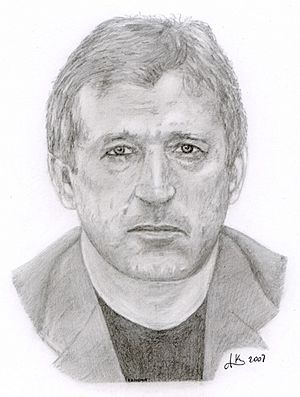
FK Sarajevo had another very successful time between 1978 and 1985. This was thanks to the amazing attacking duo of Predrag Pašić and Safet Sušić. They were two of the best players in Yugoslav football history. Sušić was named Player of the Season twice and was also a top scorer in the league.
In 1980, the club finished second in the league. This allowed them to play in the 1980–81 UEFA Cup. They also reached the Yugoslav Cup final in 1983.
Sarajevo won their second championship title in the 1984–85 season. They finished four points ahead of Hajduk Split. The season started with some ups and downs, but the team soon found its rhythm. They went on an amazing seven-game winning streak.
Key players like Husref Musemić and Predrag Pašić scored crucial goals. The team stayed in first place until the end of the season. The final match was against Red Star Belgrade at a sold-out Koševo stadium. Sarajevo needed just one point to win the title. They won 2–1, and the celebrations began!
This victory qualified the club for the 1985–86 European Cup. However, they had a surprising loss to Finnish side FC Lahti. This is still considered one of Sarajevo's toughest European results. The championship team included stars like Husref Musemić, Faruk Hadžibegić, Davor Jozić, and Predrag Pašić.
Years Before the War (1985–1992)
After winning their second title, FK Sarajevo faced a challenging period. Many key players from the championship team left the club. For example, Husref Musemić joined Red Star Belgrade, and Faruk Hadžibegić moved to Spain.
The club brought in young players to replace them. However, the team struggled in the league, often finishing in lower positions. More players continued to leave the club in the following seasons.
In 1989, fan favorite Husref Musemić returned to the club. In 1990, Fuad Muzurović became manager again. The club also signed its first foreign player, Soviet goalkeeper Aleksei Prudnikov.
The 1991–92 season was cut short because Yugoslavia began to break apart. Bosnian, Croatian, and Slovenian clubs left the league. FK Sarajevo played its last game in the Yugoslav First League on April 5, 1992. This was just one day before the start of the Siege of Sarajevo. Football stopped completely in Bosnia and Herzegovina for four years due to the war.
Sarajevo as a Touring Club (1992–1994)
The Bosnian War stopped all competitive football in the country. Because of this, FK Sarajevo became a touring club in 1993. They traveled to play matches and raise awareness. Players like Elvir Baljić and Almir Turković, who would later play for the national team, were part of this touring squad.
Many of the club's fans, including the famous group Horde Zla, joined the army to fight in the war. In February 1993, the team managed to escape the besieged city under heavy sniper fire. They reached Split, where they played friendly games.
The club then traveled to Slovenia and Turkey, playing humanitarian matches. These games helped collect aid for Bosnia. They also toured the Gulf of Arabia, visiting Kuwait, Qatar, Oman, and the UAE. In September 1993, they toured Brunei and Malaysia. They even played and won against the Iranian national team in Teheran.
In November 1994, the club was invited to Italy. They played humanitarian matches against famous Italian clubs like Parma and Chievo. While in Italy, the team met Pope John Paul II at the Vatican. He later visited Sarajevo in 1997. The team also toured Germany, playing against clubs like Kaiserslautern and Werder Bremen.
After returning to Sarajevo, the team played a symbolic match against a UN peacekeeping force. This was the first game at the Asim Ferhatović Hase Stadium in over two years. The club's journey during the siege became a famous story in Bosnia and Herzegovina.
New Beginnings (1994–2000)
The first-ever Bosnia and Herzegovina championship was held in 1994–95. Sarajevo finished first in their group and second in the final stage. The team had very few players at the start of this season because many had moved abroad during the war.
In the 1996–97 season, Sarajevo finished second in the league. However, they won the Cup final and the Super Cup against NK Čelik. They kept the Cup the following year.
In 1998–99, Sarajevo won the league and then the play-off series. They were crowned national champions! This was their first championship title in the new Bosnian league. Important players from this team included Emir Granov, Muhidin Zukić, and goalkeeper Mirsad Dedić.
The Joint League Era (2000–2013)
The top football competition in Bosnia and Herzegovina was renamed the Premier League of Bosnia and Herzegovina in 2000–01. In 2004, Safet Sušić, a former FK Sarajevo star, was voted Bosnia and Herzegovina's best player of the last 50 years by UEFA.
In the 2006–07 season, Sarajevo won its second Premier League title. They beat Zrinjski Mostar by three points. This was a special year as the club celebrated its 60th birthday. In the final match, 25,000 fans watched Sarajevo win 5–0 and bring the title home. Key players from this team included Muhamed Alaim, Veldin Muharemović, and Almir Turković.
After winning the league, Sarajevo played in the UEFA Champions League for the first time in its modern format. They beat Maltese champions Marsaxlokk F.C. and Belgian club KRC Genk. However, they were knocked out by Ukrainian champions Dynamo Kiev before reaching the group stage. The club also regularly played in Europa League qualification but did not reach the group stages during this period.
The Vincent Tan Era (2013–2019)
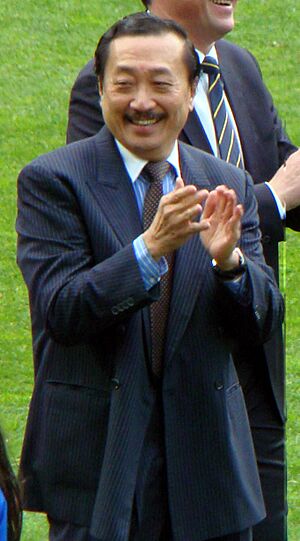
In late 2013, Vincent Tan, a Malaysian businessman and owner of Cardiff City, bought FK Sarajevo. He promised to invest $2 million in the club. Under his ownership, the club brought in talented players like Miloš Stojčev and Džemal Berberović. These players helped the club win the 2013–14 Bosnian Cup. This was their first trophy since 2007.
Mr. Tan also showed great generosity. In 2014, he donated money to hospitals in Doboj and Maglaj after severe floods hit Bosnia. He also made a personal donation for flood relief.
In the 2014–15 UEFA Europa League, FK Sarajevo had a good run. They eliminated FK Haugesund and Atromitos. They then faced German side Borussia Mönchengladbach in the play-off round but lost.
In 2015, the club won the league title again after an eight-year wait. They defeated Sloboda Tuzla in the final game of the season.
New Ownership and Recent Success (since 2019)
Vincent Tan later sold FK Sarajevo to a Vietnamese businessman, Nguyễn Hoài Nam. Tan wanted to focus more on his other club, Cardiff City.
Under the new ownership, FK Sarajevo has continued to be very successful. The club won back-to-back Premier League titles in 2018–19 and 2019–20. They also won the 2018–19 Bosnian Cup.
The 2019–20 season ended early due to the COVID-19 pandemic in Bosnia and Herzegovina. As a result, FK Sarajevo entered the 2020–21 UEFA Champions League qualifying rounds. They won their first match 2–0 against Connah's Quay Nomads.


